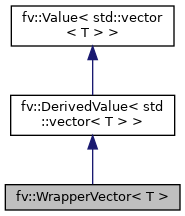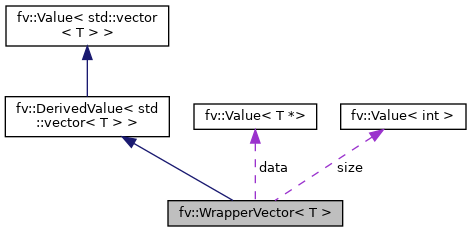A std::vector wrapper around a C-style array. More...
#include <value.hpp>


Public Member Functions | |
| WrapperVector (Value< int > *size, Value< T *> *data, const std::string &alias="") | |
 Public Member Functions inherited from fv::DerivedValue< std::vector< T > > Public Member Functions inherited from fv::DerivedValue< std::vector< T > > | |
| DerivedValue (const std::string &name, const std::string &alias="") | |
| std::vector< T > & | get_value () |
| Calculate, if necessary, and return the value held by this object. | |
 Public Member Functions inherited from fv::Value< std::vector< T > > Public Member Functions inherited from fv::Value< std::vector< T > > | |
| Value (const std::string &name, const std::string &alias="") | |
Private Member Functions | |
| void | update_value () |
| Updates the internal value. More... | |
Private Attributes | |
| Value< int > * | size |
| Value< T * > * | data |
Additional Inherited Members | |
 Protected Attributes inherited from fv::DerivedValue< std::vector< T > > Protected Attributes inherited from fv::DerivedValue< std::vector< T > > | |
| std::vector< T > | value |
| bool | value_valid |
Detailed Description
template<typename T>
class fv::WrapperVector< T >
A std::vector wrapper around a C-style array.
In order to make some of the higher-level Value types easier to work with, it is a good idea to wrap all arrays in the original data source with std::vector objects. To do this, it is necessary to supply both a Value object containing the array itself as well as another Value object containing the size of that array. Currently, update_value will simply copy the contents of the array into the interally held vector.
Member Function Documentation
◆ update_value()
|
inlineprivatevirtual |
Updates the internal value.
This function should be overridden by any child class to do the actual work of updating value based on whatever rules the class chooses. Normally, this consists of geting the values from some associated Value objects, doing some calculation on them, and storing the result in value.
Implements fv::DerivedValue< std::vector< T > >.

The documentation for this class was generated from the following file:
- /home/caleb/Sources/TTTT/filval/value.hpp
 1.8.13
1.8.13